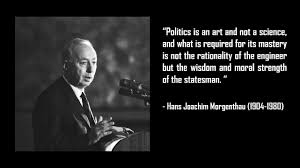
The discipline of International Relations (IR) is usually explained as a historical succession of schools and theories (such as “realism”, “neorealism”, “constructivism”, “Marxism”, “feminism”, etc.) which would pursue different approaches. This approach suggests often inappropriate theoretical divides as well as the idea of a steady improvement in our analysis of international politics, suggesting that our understanding of international politics would increase the more we approach the present day. An alternative approach for the study of international politics has recently emerged. This approach does not focus on “-isms”, but on political issues such as war, poverty, gender, and so forth. This is a step in the right direction, however, this lecture goes further, focusing on theoretical, analytical concepts, not on political concepts, that challenge our study of politics. The difference between political and analytical concepts is crucial: whereas political concepts focus on practical problems and political agency, theoretical concepts address and focus on the analysis of politics.
The lecture offers a novel approach to the study of international relations and IR. By focusing on key analytical themes that challenge the study of international politics, students are guided in analysing international politics according to these themes and challenges.
- Enseignant: Hartmut Behr
